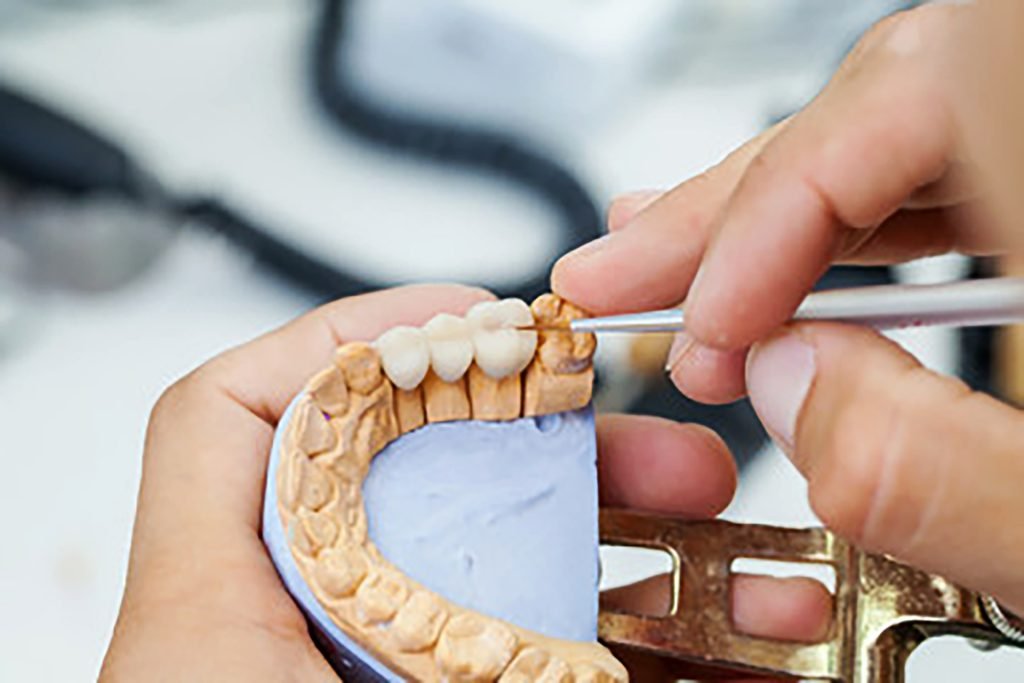Crown

A dental crown, also known as a dental cap, is a type of dental restoration that covers or encircles a tooth entirely or partially. Crowns are custom-made to fit over the prepared tooth, restoring its shape, size, strength, and appearance. They are often used to protect and strengthen a weakened tooth, improve its aesthetics, or restore functionality lost due to damage or decay. Here’s an overview of the dental crown process: Evaluation Before getting a dental crown, the dentist evaluates the tooth’s condition, often using X-rays, to determine if a crown is necessary and whether the tooth can support it. Tooth Preparation To accommodate the crown, the tooth is reshaped by removing a portion of its outer surface. This process involves trimming the tooth’s enamel and shaping it into an abutment that can securely hold the crown. Impressions Once the tooth is prepared, impressions or digital scans of the tooth and surrounding teeth are taken. These impressions are used to create a custom-made crown that precisely fits the prepared tooth and matches the color and shape of the surrounding teeth. Temporary Crown If the final crown is fabricated in a dental laboratory, a temporary crown may be placed over the prepared tooth to protect it while the permanent crown is being made. This temporary crown is usually made of acrylic or stainless steel and is not as durable as the permanent crown. Fabrication of the Crown The impressions or digital scans are sent to a dental laboratory, where skilled technicians fabricate the permanent crown. The crown can be made from various materials, including porcelain, porcelain-fused-to-metal, all-metal (such as gold or silver), or zirconia. The choice of material depends on factors such as the location of the tooth, aesthetic preferences, and functional requirements. Placement of the Crown Once the permanent crown is ready, it is cemented or bonded onto the prepared tooth using dental adhesive. The dentist ensures that the crown fits properly, matches the surrounding teeth, and provides optimal function and aesthetics. Dental crowns can serve several purposes, including: – Protecting a weak or damaged tooth from further decay or fracture. – Restoring the shape, size, and function of a tooth that has been significantly decayed, broken, or worn down. – Supporting and covering a tooth that has undergone root canal treatment. – Improving the appearance of a misshapen, discolored, or cosmetically flawed tooth. With proper care and maintenance, including regular brushing, flossing, and dental check-ups, a dental crown can last for many years, providing long-term protection and functionality for the treated tooth.
Why Zirconia Crowns are Highly Recommended?

One of the challenges in dental restoration is to restore the functionality of teeth, which is essentially to grind and chew food for proper digestion. Over the years so many materials were discovered, tested and applied not just to regain the teeth grinding and chewing ability but also for easthetic purposes. Several materials with metal properties such as titanium, gold along with ceramics, porcelain and the likes have brought innovation in the field of dentistry. But up until recent years Zirconia crowns have gained popularity because of its notable aesthetic factor that mimics the look of natural teeth due to its translucent property. Zirconia materials has proven to have possessed a certain level of durability and strenght, albeit it was started being adopted and utilized as dental crowns since sometime in the late 90s. It exhibits superiority over its porcelain counterparts mainly because of the comfort it offers that is brought about by its being non-abrasive nature. What is Zirconia? Zirconia (zirconium dioxide) is a white, powdered metal oxide. It is made from zirconium, a metal with similar properties to titanium and is mined around the world. It is found in dinnerware and electrical fixtures, among other products. Zirconium makes an ideal choice for dental material, especially dental crowns, because it is chemically unreactive, and its toughness fitted most in posterior area where higher strenght is required to masticate food. Zirconia’s inherent white color and high hardness, high fracture toughness (difficult to crack) properties make an ideal choice for dental crown materials. Some of its beneficial qualities are resistance to wear, resistance to oxidation, no chemical corrosion and its translucent appearance when sintered (baked). What are the benefits of Zirconia crowns? Strength Zirconia crowns have an extremely high flexural and tensile strength. Upon being subjected through rigorous laboratory testing, zirconia crowns yeild a higher percentage of bending strength than porcelain. It has an innate capacity to better withstand the normal wear and tear on teeth from grinding and chewing. Thus, restoring the functionality of teeth closest to the original state. Durability Because of its natural strength and durability, Zirconia crowns generally last longer than its counterparts. Its being non-porous in nature makes Zirconia crowns more resistant to chipping, cracking and staining. Cosmetics The natural white color of zirconium material and its translucent microstructure properties have the ability to match the shade of the original teeth, and are optimized by technology and executed by highly skilled technicians in fabrication process. The final product exhibits an elegant, custom-crafted Zirconia crowns, engineered to seamlessly integrate into your smile. Comfort Due to the non-abrasive nature of the material, Zirconia crowns offer a superior level of comfort. The product has a smooth exterior surface, which prevents abrasion to surrounding teeth and gum tissue. Abrasive materials produce frictions in the course of its function that may cause damage to the surrounding teeth and soft tissues. To find out if Zirconia crowns are the best choice for you? You may call/text (02) 921-1729, 0918-4008899, 0917-9685003 or click this link (Book An Appointment) to book an appointment and avail your complementary consult.

